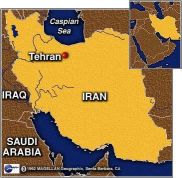By Daan de Wit
Translated by Ben Kearney
The issue of Iran is immersed in a fog of propaganda, deception, fear and interests. Once you step out of the fog and rise above the news coverage about Iran you see that a battle is being waged on multiple fronts. It is a war about power. Based on fear and interests, this power struggle has to do with arriving at an answer to the question of which side will ultimately be able to maintain power, or be able to shift the balance of power in their own favor. All means to accomplish this end are fair game, including the use of deception and propaganda in the most critical part of the struggle: the one being waged for the hearts and minds of the people.
Deception and propaganda can be seen in the outermost layer of the conflict, which is defined by the notion that a nuclear Iran is an assault on the relative peace in the world. The question therefore is whether or not Iran is working on a nuclear weapon. This question also lies at the heart of the conflict, but for different reasons. All parties involved know that, from the moment that Iran becomes a nuclear power, it will have to be dealt with on equal terms. This is a state of affairs that Iran actively aspires to, and one which Israel is actively trying to prevent, together with the U.S. and even countries such as Saudi Arabia. That country, along with the U.S. and Israel, are dreading the moment when they lose their dominance over the region: Saudi Arabia fears the growth of Shiite influence, the U.S. is concerned about its own strategic interests - including oil and gas - and Israel is worried, likewise due to strategic interests, but also for practical reasons: it is in a very vulnerable a position due to its geographic location. Israel is a small country in a large, hostile region, and if things get nasty, the blows will be felt harder in Tel Aviv than in Washington.
 In a region without nuclear weapons, Israel is like the one-eyed man in the land of the blind. Were this situation to change, and were Iran to obtain a nuclear weapon as well – after which other countries in the region would also arm themselves with nuclear weapons – Israel would be very vulnerable. The Iranians say that this is not the case and that it is not going to happen, but what is striking about the current allegations and the media drumbeat is that in this aspect it could play into Iran's hands. Specifically it could contribute to the idea that Iran is a major threat, even without the country possessing a nuclear weapon in the first place. This would be positive for Iran because it would allow the country to enjoy the benefits of owning nuclear weapons without actually having any.
In a region without nuclear weapons, Israel is like the one-eyed man in the land of the blind. Were this situation to change, and were Iran to obtain a nuclear weapon as well – after which other countries in the region would also arm themselves with nuclear weapons – Israel would be very vulnerable. The Iranians say that this is not the case and that it is not going to happen, but what is striking about the current allegations and the media drumbeat is that in this aspect it could play into Iran's hands. Specifically it could contribute to the idea that Iran is a major threat, even without the country possessing a nuclear weapon in the first place. This would be positive for Iran because it would allow the country to enjoy the benefits of owning nuclear weapons without actually having any.
Even nowadays possessing a nuclear weapon is a critical element in the struggle for power. This cold war could turn into a hot war, and in preparation for such a scenario, America has for some time now been busy beefing up the defensive capabilities of its allies in the Middle East. To quote The Next War: ‘In preparation for a possible war with Iran, the United States has already taken a number of concrete military steps: air force units of friendly Arab states are being trained, Patriot missile batteries are being stationed in Gulf states, Israel is being integrated into the American missile shield just as it was during the two Gulf Wars, and unmanned aerial vehicles are spying on Iran and trying to entice them into activating their radar so as to gather information in the process.’ In addition it became clear that President Bush gave the CIA the green light to ‘carry out ‘black’ propaganda and disinformation campaigns designed to destabilize the regime in Tehran, and also that the U.S. deployed the terrorist groups Jundullah and Mujahedin e-Khalq (MEK) for military actions and acts of sabotage.’  It is not known whether Obama has adopted this strategy, but he has carried on with the 400 million dollar destabilization program that was previously mentioned in this series.
It is not known whether Obama has adopted this strategy, but he has carried on with the 400 million dollar destabilization program that was previously mentioned in this series.
Both sides are armed to the teeth and are prepared to exact serious harm to each other and to the global economy. But it doesn't have to come to that. Another possibility would be to decide - as was done with China in its time - to accept the fact that there is a country out there that isn't going to go along and is instead determined to follow its own course. Given the current state of affairs, the chances of this happening are quite slim. All indications are that Iran and its adversaries are like two trains on the same track bearing down on each other at full speed.

 mail this article
mail this article print
print
